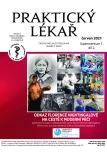Parallels between Florence Nightingale’s Time and Contemporary Nursing
Authors:
Vít Blanař 1,2
Authors‘ workplace:
Fakulta zdravotnických studií, Univerzita Pardubice
1; Klinika otorinolaryngologie a chirurgie hlavy a krku, Pardubická nemocnice, Nemocnice Pardubického kraje, a. s.
2
Published in:
Prakt. Lék. 2021; 101(Suplementum 1, díl 2.): 5-6
Category:
Editorial
The conditions in which nursing care is provided have dramatically changed since the times of Florence Nightingale. Therapeutic, diagnostic and preventive procedures are still developing dynamically. Nursing has become an independent discipline. However, the roots of nursing from the times of Florence Nightingale are still clearly discernible today, as is the basis for contemporary patient care and evidence-based practice. The Crimean War (1853–1856) was one of the bloodiest conflicts of its time. There was a staggering number of seriously wounded soldiers. Their conditions were often complicated by infectious diseases, which included, in particular, wound infections and diarrheal diseases. High numbers of wounded soldiers were treated by a limited number of nursing staff accompanied by very few volunteers and doctors. The Covid-19 pandemic compels us to make a comparison with the above-mentioned situation when, in some countries, the numbers of critically ill patients and the deceased are becoming comparable to those of a military conflict.
Despite the latest sophisticated examination and treatment methods, modern medicines, devices, aids, and consumables facilitating our work, we should not forget what Florence Nightingale paid attention to — systemization of nursing care, organizational procedures, dietary composition, rehabilitation, bowel management, and mental health care. Using these procedures, she was able to reduce patients’ mortality and alleviate their suffering even with the limited nursing staff. She always promoted high-quality nursing care with an emphasis on education, which is certainly also a subject of your interest. As you, the readers of this editorial, are either participants of the international scientific conference held at the Faculty of Health Studies of the University of Pardubice or are simply interested in papers published in this conference proceeding.
Research in our field is inextricably linked to the quality of nursing care and the quality of education of non-medical healthcare professionals. The beginnings of nursing research were also significantly influenced by Florence Nightingale and her life’s work. Her organizational measures in the care of the wounded, in hygiene, nutrition, and the overall systematization of nursing care were a synthesis of knowledge and the results of her observations. Subsequently, she applied the knowledge into her practice, and then again subjected it to evaluation. Just like us today, she summarized and published her findings 162 years ago. Evidence of her efforts to spread ideas and results of her research is her book Notes on Nursing: What it is and What it is Not. Although we often do not realize it, even today, behind every little progress and innovation in nursing care there is a “nurse-researcher” and her team — the team that organized the data collection, systematized it, analysed it, discussed the results in the professional community (perhaps in the form of a conference paper), and finally published and disseminated them. I am overjoyed that this conference proceeding contains articles that display our efforts to improve nursing care and ensure progress in our field.
The parallel between nursing in Florence Nightingale’s time and the present is evident. The Lady with the Lamp applied her experience and knowledge from the Crimean War. Let’s get inspired and let’s utilize the knowledge gained from the health crisis caused by the COVID-19 pandemic. Let’s gain the maximum possible experience and knowledge, and learn our lessons from this pandemic. Let’s evaluate all conceivable variables in nursing care. Let’s publish the results and apply them to practice, education and further research in nursing. Let’s prepare the next generation of quality workers in nursing. Let’s stay true to Florence Nightingale’s ideas!
Mgr. Vít Blanař, Ph.D.
Faculty of Health Studies, University of Pardubice, Pardubice
Labels
General practitioner for children and adolescents General practitioner for adultsArticle was published in
General Practitioner

2021 Issue Suplementum 1, díl 2.
- Advances in the Treatment of Myasthenia Gravis on the Horizon
- Hope Awakens with Early Diagnosis of Parkinson's Disease Based on Skin Odor
- Memantine in Dementia Therapy – Current Findings and Possible Future Applications
- Memantine Eases Daily Life for Patients and Caregivers
- Possibilities of Using Metamizole in the Treatment of Acute Primary Headaches
-
All articles in this issue
- Odkaz Florence Nightingalové na cestě k moderní péči
- Parallels between Florence Nightingale’s Time and Contemporary Nursing
- Comparison of Burden and Stress in Parents of Children with a Disability and Parents of Children without a Disability with Regard to Quality of Life
- Role of Nurses in Ensuring Care Quality and Safety Related to Pharmacotherapy
- The Phenomenon of Rationing Nursing Care in Czech Hospitals – a Pilot Study
- Simulation Training and Perinatal Loss
- Impacts of Mobbing on the Health of a Group of Nurses, Translation and Validation of the General Health Questionnaire-28 – Intermediate Results
- Nurses Knowledge in Presure Ulcers Management Related to the Monitoring of the Incidence and Prevalence of Pressure Ulcers: a questionnaire survey
- General Practitioner
- Journal archive
- Current issue
- About the journal
Most read in this issue
- The Phenomenon of Rationing Nursing Care in Czech Hospitals – a Pilot Study
- Role of Nurses in Ensuring Care Quality and Safety Related to Pharmacotherapy
- Comparison of Burden and Stress in Parents of Children with a Disability and Parents of Children without a Disability with Regard to Quality of Life
- Impacts of Mobbing on the Health of a Group of Nurses, Translation and Validation of the General Health Questionnaire-28 – Intermediate Results
